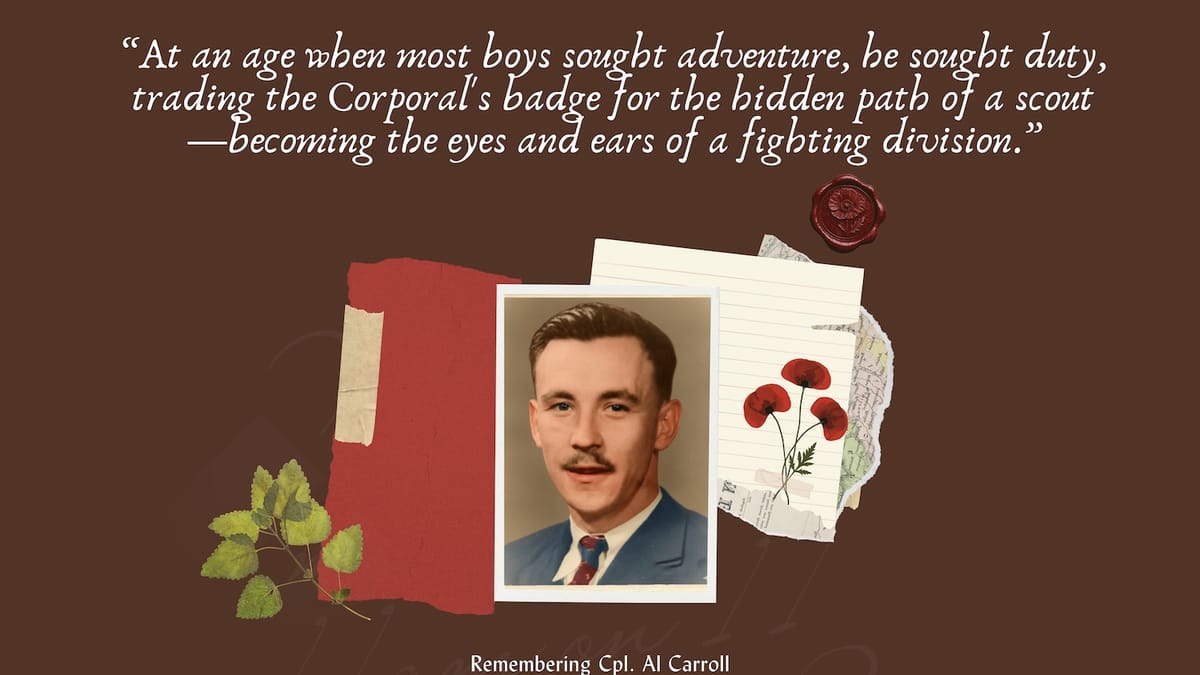“At an age when most boys sought adventure, he sought duty, trading the Corporal's badge for the hidden path of a scout—becoming the eyes and ears of a fighting division.” - Futurist Jim Carroll

My dad joined the Canadian Army at the age of 16, one day after Poland was invaded. Not only that, he downgraded his rank voluntarily while in Italy so that he could be a motorcycle patrol scout on the front lines.
Today, as we mark November 11 - known as Remembrance Day in Canada - I'll share the details I learned about my dad's service in World War 2 after finally obtaining his war records.
One key point - one of his primary roles as an intelligence scout had him busy on motorcycles on the front lines for a time. In that context, tomorrow, I will I will tell the story of how his father, who went by the stage name Cannonball Mack as a stunt motorcycle rider but with the real name Alred Morrell, died in a motorcycle accident when my dad was but 3 years old! Wait until you see that story!
My dad was actually born in the USA, in Norwich, Connecticut, and after that accident, he moved with his mom to Halifax, Nova Scotia. She remarried to an Edmond Carroll, who was a soldier in WW1 and subsequently worked in the merchant marine. And then, at the age of 16 - after backdating about his age on his signup sheet - he joined the Canadian Army and began to serve.
That was one bit of remarkable insight. The second, which I share below, was that he voluntarily downgraded his military rank while in the Italian theater to be an intelligence scout for his unit - the eyes and ears out on the front lines - instead of being a corporal back of the active lines. He sought combat - and he sought to play a role.
To piece all this together, I dug deep. Many years ago, I sought his war records from Library and Archives Canada. Tremendously overworked and underfunded, this proved to be a process, but I eventually received them in two tranches, spread over a decade. I just received the second set a few weeks ago and began to summarize what I could find.
This is where AI proved to be wonderfully remarkable, particularly Google Gemini. Many of the records were barely legible, given the cursive writing, but it was able to extract relevant details.
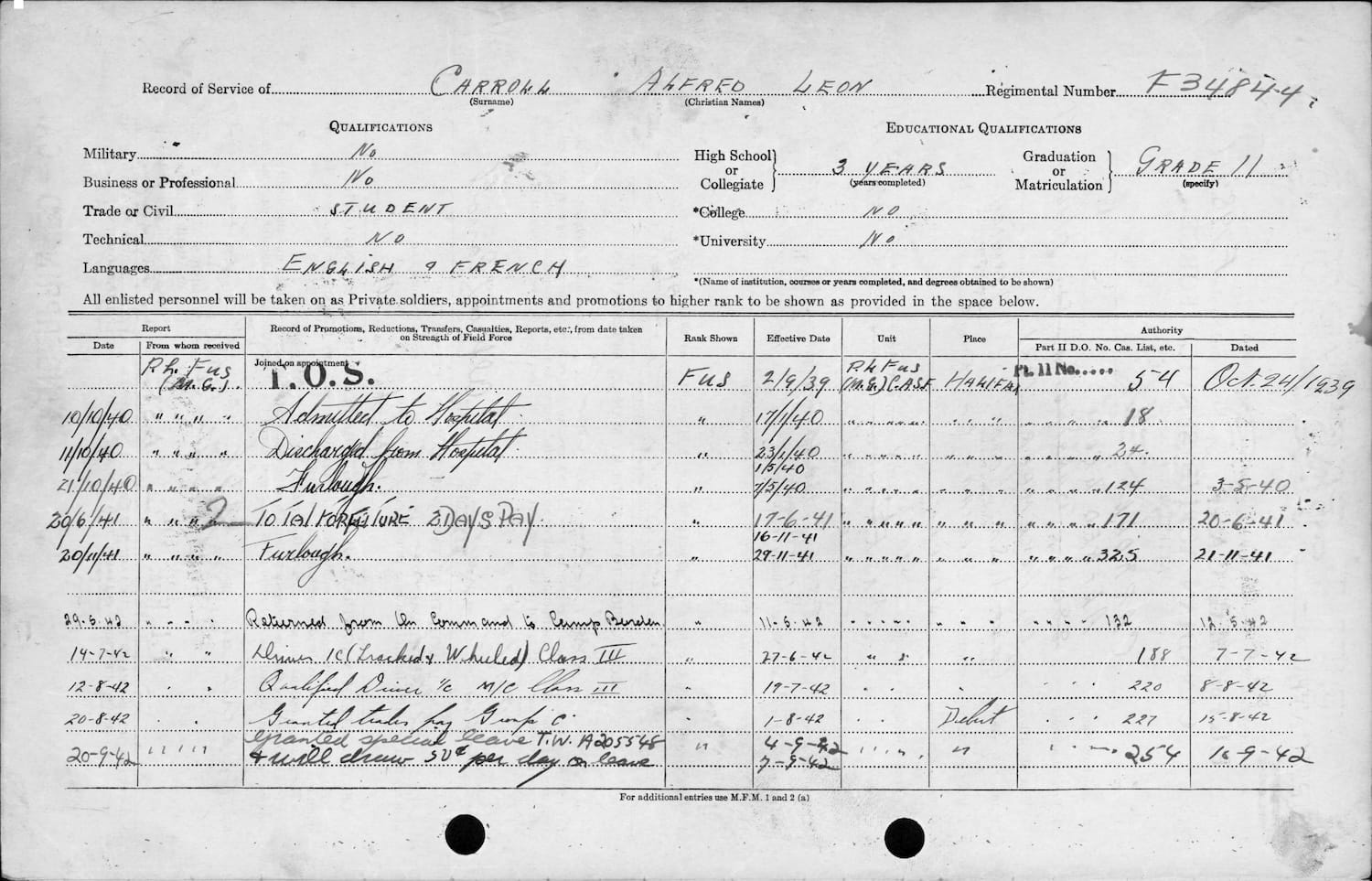
So this page above, once captured, became this data:
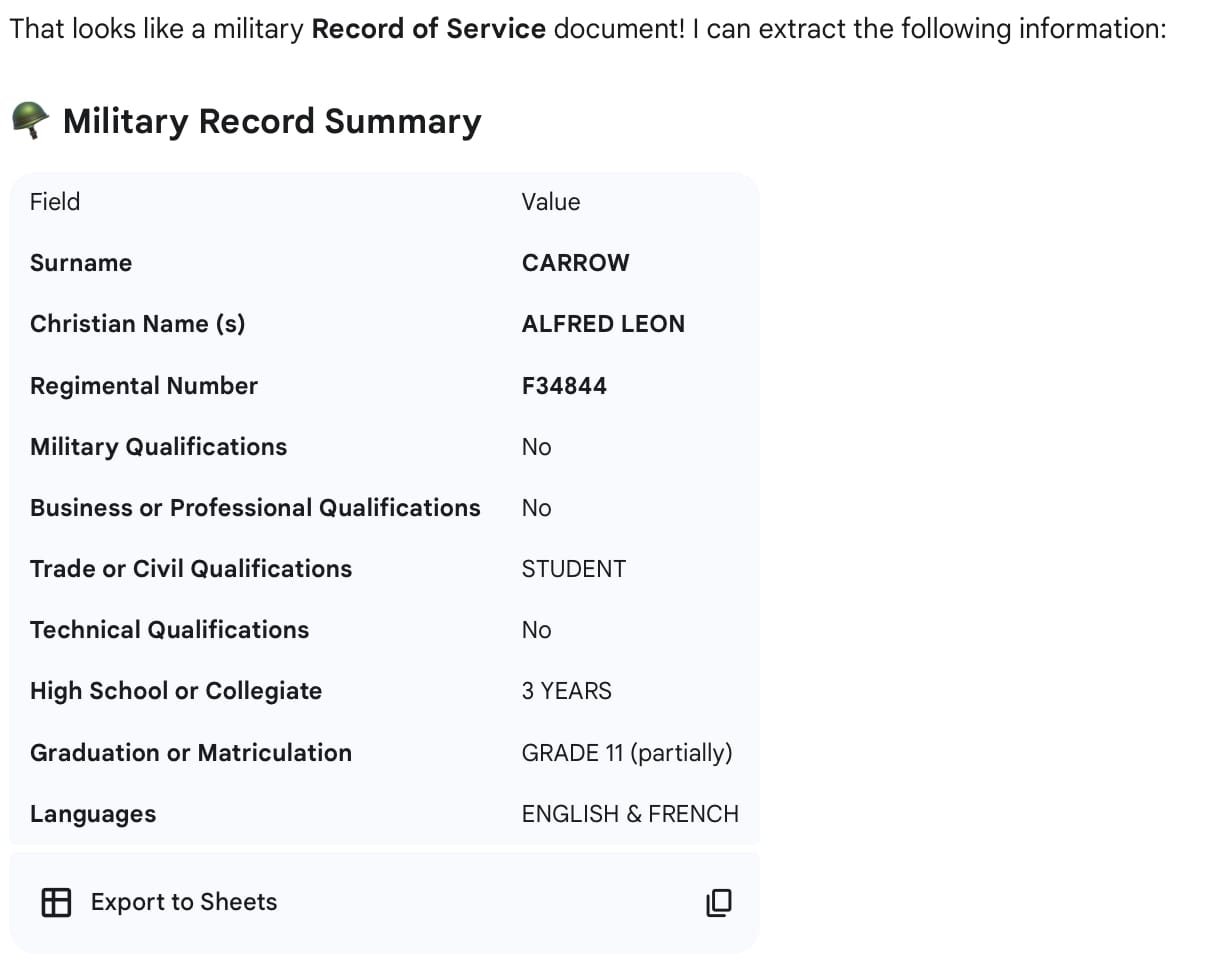
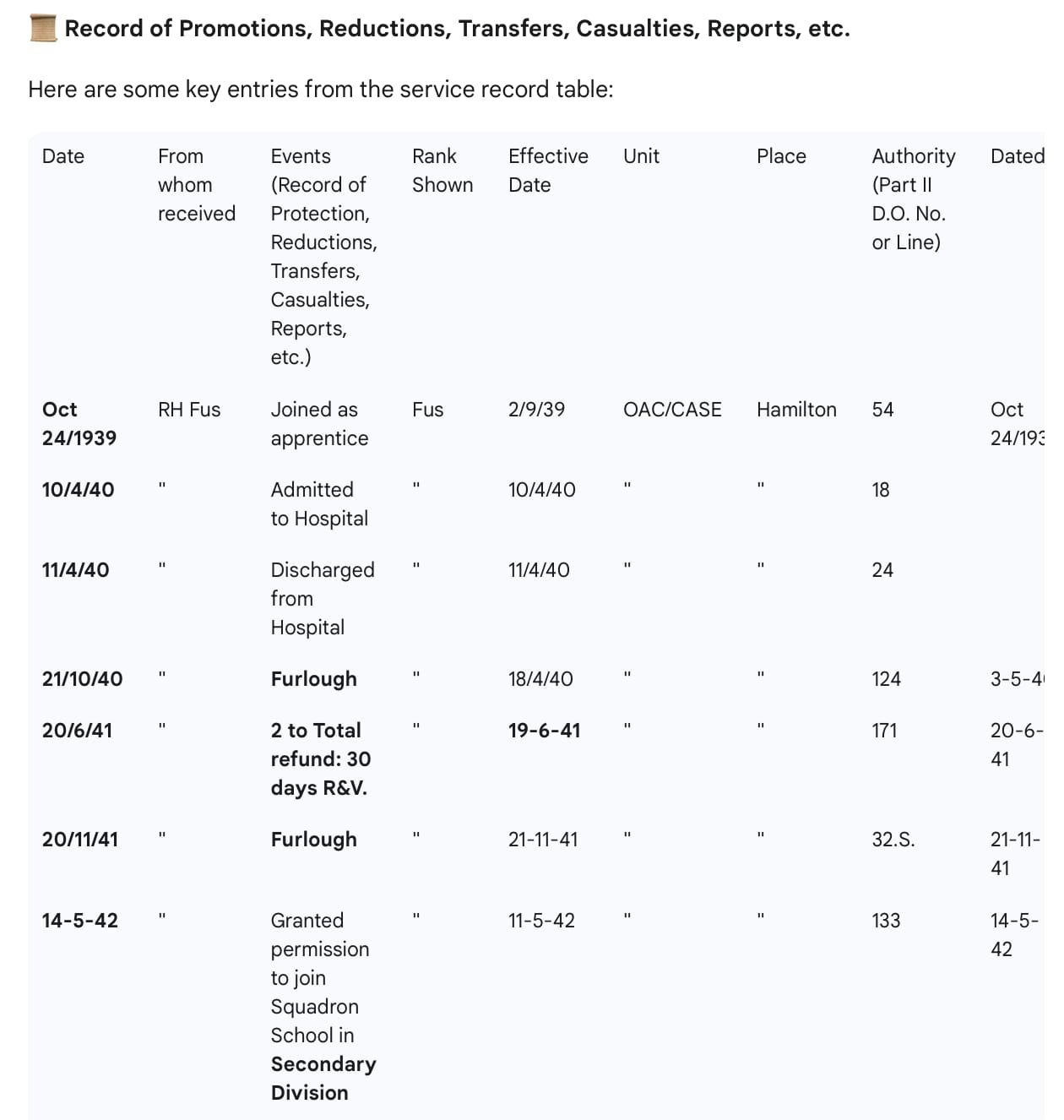
From all of this, I began to compile his story.
The essence of his service is found in this PDF. Later, below, there are two more PDFs that outline his service in the context of the greater scheme of the campaigns in which he fought and the actions underway in the war. Get the PDF here. To me, they are a remarkable read - I hope you find them to be the same.
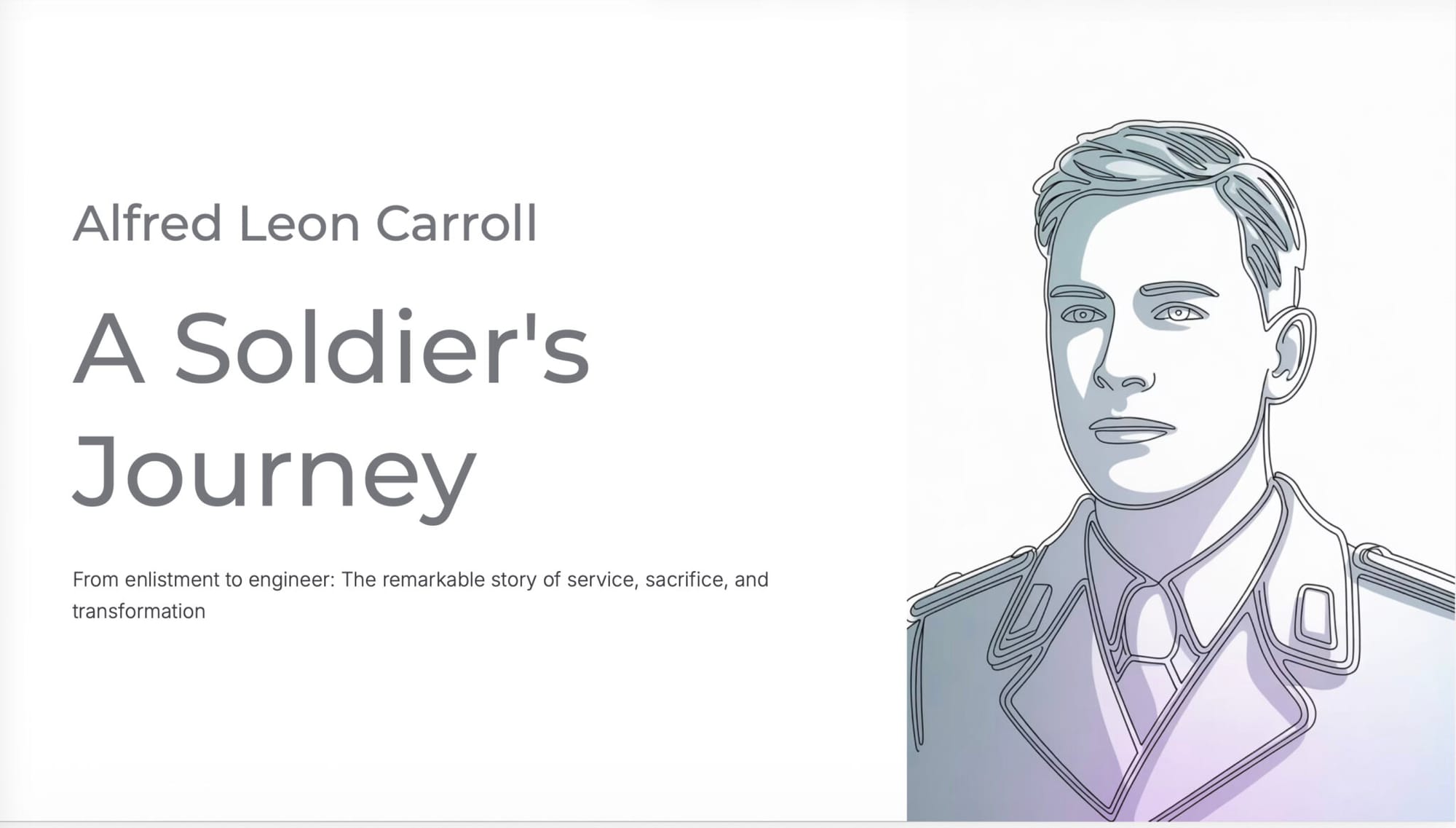
There's quite a bit that I learned!
- He enlisted at the age 17 on September 2, 1939 - you were allowed to sign up at the age of 16 or 17 with parental consent. He would turn 18 just two months later.
- But wait - he wasn't 17 when he signed up for military service - he was 16! A comprehensive review of all his records revealed that he backdated his birthdate to 1921, from 1922, to serve!
- He apparently was very eager to sign up - the war hadn't yet started, at least with Canada not declaring war until September 10
- The headlines that morning of September 2 would have referred to the German invasion of Poland just the day before, on September 1, and so he was straight into the military before many others
- He served an exact total of 6 years, 47 days, and earned the sum of $882.54 for doing so (known as a "War Service Gratuity")
- His initial unit was the Princess Louise Fusiliers (Machine Gun Division), and his starting rank was Fusilier.
- He completed a very long training period in Canada, serving there for over three years (Sep 1939 to Oct 1942) before embarking overseas, most of this in the Halifax area, as well as the Debert military base. Just yesterday, I found the ship arrival record, showing him arriving in the UK on November 10th - his birthday - 1943.
- His war records noted that he was an exceptional teacher, earning an "Excellent" rating and a formal assessment as an "Exceedingly clever and good lecturer" when he qualified as a Unit Instructor, Class I (I find this really interesting, given what my career has become!)
- He attained three driving/mechanical qualifications: Motorcyclist Class III, Driver i/c (Wheeled) Class III, and Driver Operator.
- He served 32 months as a Signalman and 36 months as a Driver Operator.
- He voluntarily reverted from Corporal to Fusilier at his own request on June 12, 1944, during the intense Italian Campaign. More on this below, as this is a significant part of the story
- He participated in two major combat theaters: the Italian Campaign and the North-West Europe Campaign (UK, Italy, France, Germany/Netherlands).
- He was hospitalized with Benign Tertian (B.T.) Malaria for 12 days in Italy in July-August 1944; his malaria was treated with the standard antimalarial drugs of the era: Quinine and Mepacrine.
- He was confined to barracks for 10 days immediately after the war, the reason unknown. But I continue to research that, and the reason might turn out to involve a stunning turn of events.
- His hobbies? As noted in his war records, reading, photography, and badminton.
- He received six medals and decorations for his service.
- A counselor assessed him post-war as having "very high learning ability" and "Excellent prospects for advanced education".
- His ambitious post-war goal was a degree in Chemical Engineering.
- He used his DVA support to attend Dalhousie University for pre-engineering and N.S. Technical College for his specialized degree.
- He achieved his goal, graduating in 1950 with a Bachelor of Engineering (Chemical), and was employed immediately by Canadian Resins and Chemicals Ltd. in Shawinigan Falls, Quebec.
So why did he sign up even before the war was officially declared? His records contain a hint of this: one record explicitly states the "Reason for Joining Cdn. Army" was that "His father was C.S.M. & asked him if he would like to join.". This meant that this dad (actually, stepdad - more on that tomorrow!) confirms that his father, a Company Sergeant Major (C.S.M.), directly influenced the 16-year-old's decision, providing the personal context for his immediate and long commitment to service.
There are two other very useful PDFs here worth exploring that take his war service above and put it into the larger context of the war. The first is here.
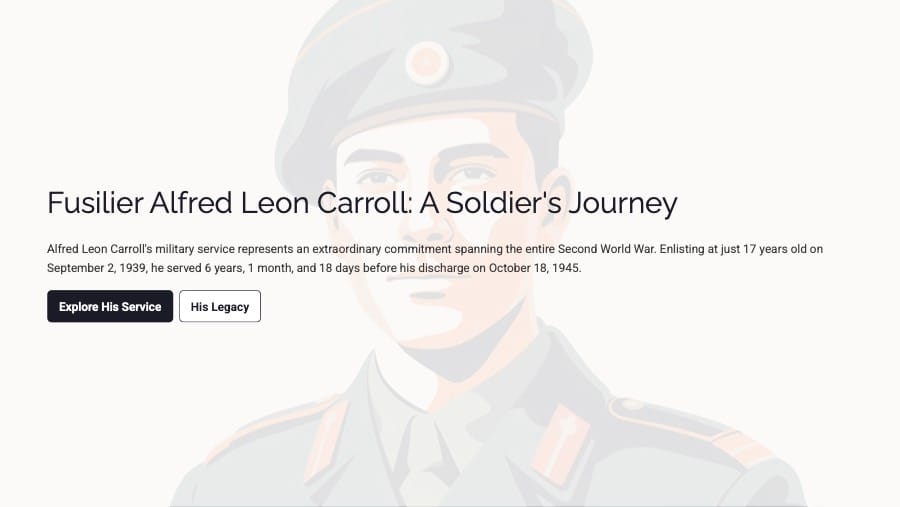
The next one is here.

But after compiling all this, one suggestion from ChatGPT led me down a new path - and it is fascinating to say the least!
His war service? An enigma wrapped in a riddle!
It's surreal how little I knew about my dad's six years of service. That quiet demeanour was typical of his generation, and the joking comments he’d sometimes make about being a "spy" were often the only clues we had. Looking at his military records now, that casual comment may hold a kernel of truth, pointing directly to his specialized role in forward reconnaissance.
What's that? Based on his records, it's highly likely he served in duties closely associated with the function of a Scout Platoon, even if he wasn't permanently posted to one. This unit's job was classic reconnaissance—acting as the "eyes and ears" for the division, a sort of army "spy" function at the front of the line.
Being on a motorcycle and a radio operator meant that his primary role was as a fast-moving scout, able to observe with this excellent vision (and particularly, night vision) and relay that information back to HQ.
The most compelling proof came from a personnel assessment, which specifically noted his suitability for this dangerous role. A military assessor listed a potential placement for him as "Suitably placed as D.O. [Driver Operator] Scout Platoon". This tells me that the people in charge knew his unique skill set was ideal for forward operations. Here's the relevant page from his records - the placement recommendation is down near the bottom right, in bold.
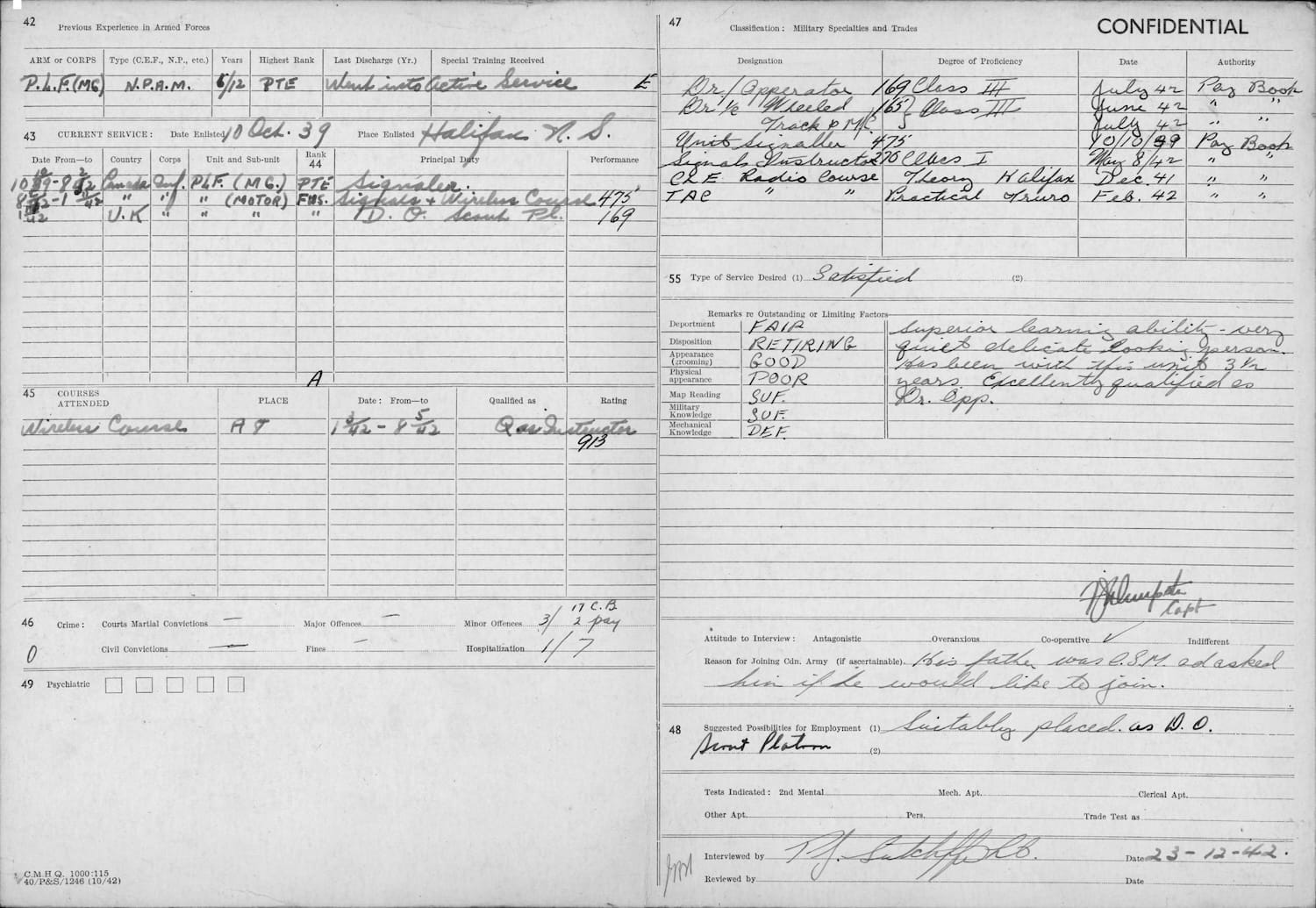
The Dual-Use Skills That Made Him Invaluable
My dad’s success in this role stemmed from two core qualifications that made him indispensable to the Scout Platoon's operational tempo: mobility and communication.
As I dug into this role, here's what I learned:
- Wireless Operator/Signals Specialist: Scout platoons operated ahead of the main body, and radio nets were crucial for instant reporting of enemy locations and terrain. My dad wasn't just a qualified Wireless Operator; he was a highly-rated Signals Instructor, Class I. This expertise made him the essential link responsible for keeping communication flowing under fire.
- Driver Operator/Mobility Expert: Reconnaissance is all about speed and getting intelligence back fast. My dad was qualified as a Motorcyclist and a Driver i/c (wheeled). This meant he was relied upon for rapid movement, dispatch duties, and safely transporting sensitive signal equipment to and from forward positions.
In that context, think about the unit he served with - the 11th Independent Machine Gun Company (Princess Louise Fusiliers). While their main job was heavy fire support, their platoons were often attached to infantry brigades and sent into forward areas. His skills were used in these forward positions, performing reconnaissance-like missions such as laying phone lines and managing wireless nets under fire.
The joking reference to being a "spy" was probably his humble way of describing the critical, high-mobility, intelligence-gathering work that his exceptional technical training enabled him to do. He wasn't a traditional rifleman; he was a technical combat specialist.
He Was Recruited for this Role!
Another interesting clue came from his eye examination: a seemingly innocuous series of scratchy writing revealed that he had excellent 20/20 vision and, in particular, excellent night vision.

And so began a remarkable turn of events.
Over the next three years, he distinguished himself by acquiring multiple, highly relevant combat support qualifications. He was deemed "Above Average" as both a Fusilier (Machine Gunner) and a Wheeled Driver.
And critically, his medical assessment, including. The vision details above highlighted "Above Average" Night Vision Quality.
His competence led to quick promotions, being appointed Acting Corporal in September 1943 and Confirmed Corporal in December 1943.
But here's where the records get interesting. While a Corporal was responsible for the highly visible, administrative, and disciplinarian tasks of a Section Commander, the confidential personality profile in his records told a different story. He was assessed as having "Superior mental ability," but was notably "RETIRING," "quiet & definite," and "reluctant to look & draw attention to himself".
This internal conflict became a matter of strategic importance when he was specifically identified for an elite role: when he was identified for a position as a Scout Platoon. Here's where AI helped me interpret what happened. It seems a senior officer or unit recruiter asked him to "withdrew [his] file & asked for him if he would like to join" the Scout Platoon. This was an unusual and high honour, signifying he was hand-selected as an elite asset for a critical operational unit.
Why?
The Scout Platoon represented an opportunity where his superior technical skills and retiring nature perfectly converged:
- The Mission: The Scout Platoon was the battalion commander's "eyes and ears". Their role demanded stealth, solitude, and superior operational skill in high-stakes reconnaissance and security. They conducted dangerous, often overnight, behind-enemy-lines patrols to prevent surprise or ambush.
- The Fit: His "Above Average" night vision was crucial for this work under darkness. His Driver/Machine Gunner dual-trade made him ideal for the mobile, specialized engagements of the Scouts.
But he couldn't do this as a Corporal, and had to voluntarily demote himself back to the basic role of Fusilier. And that being the case, he did so on the 12 of June, 1944, while in Italy.
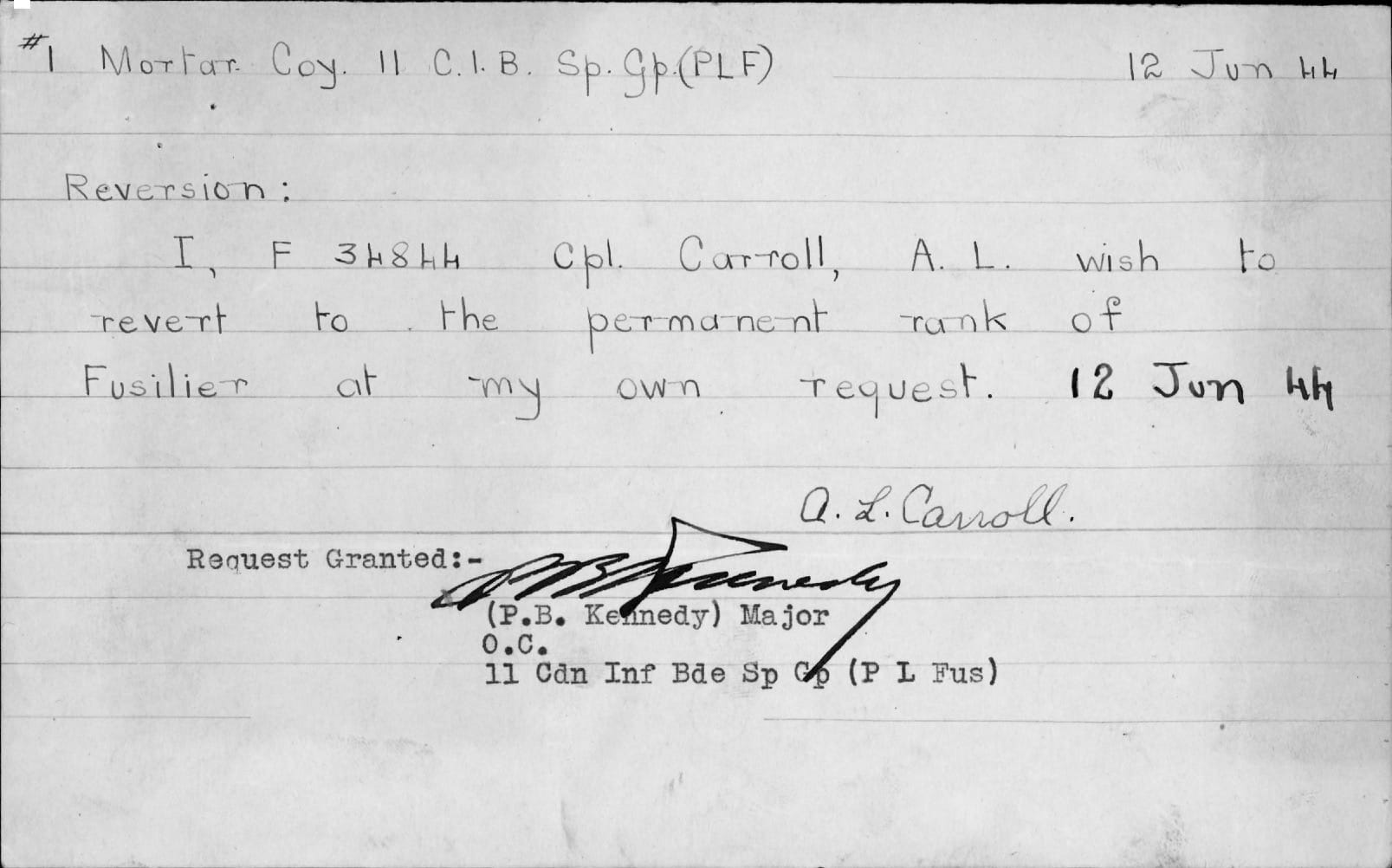
Bottom line? He chose the operational stress of the elite scout over the command stress of the Corporal's rank.
His subsequent voluntary demotion on February 24, 1944—when he formally requested to "revert to the permanent rank of Fusilier at my own request"—was a tactical decision to ensure his eligibility for the highly coveted, active, and non-administrative Scout role.
He wanted to be a part of the front lines, acting as eyes and ears for his division, actively serving in the war, and doing his duty.
This, to me, is the mindset to be found for many who fought the battles of World War 2. And this is why we mark this day, November 11, to remember.
R.I.P. Dad.
Futurist Jim Carroll continues to research his dad's war service.

